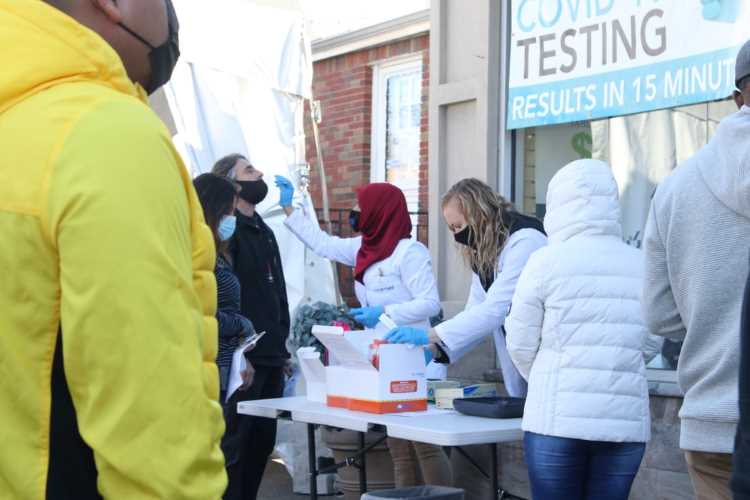
The entire globe is under the grip of fear after a new variant of coronavirus was found in the UK. At 2.07 million cases and 67,000 deaths, Britain stands seventh in the list of countries ravaged by COVID-19. At 994 deaths per million population, the country cuts a sorry figure, compared to Angela Merkel’s Germany that clocked just a third of this figure (325 deaths per million). The second wave is quite worrying and right now the country has more than it can manage. This week, UK broke the record for the maximum number of daily new cases (35,900) reported in the country. Compare this with the summer peak of 7,860 cases.
In many parts of southeast UK including London, this Christmas will be celebrated at home without family and friends visiting. Those areas have been locked down at level 4, the most stringent of all lockdowns enforced till date in the UK. This region is home to roughly one third of the country’s population. The rest of the country will be permitted to have three family gatherings, but only on Christmas day. What made the UK government adopt such a stringent stance during Christmas season?
A little change in the bug architecture, just a little — but enough to press the panic button on a global scale. Not just the UK, the entire world is now worried.
READ I MSP guarantee key to ending exploitation of farmers
The variant in picture here is the B 1.1.7 which has a distinctive set of mutations that are worrying medical researchers. The variant started scratching the radar in early December and some of those samples were collected from patients in the UK as early in September. It seems the story was in the making for months before we saw it.
The mutations in coronavirus are not a new phenomenon and Covid-19 too had its set of regular mutations. What separates the new entrant from the rest is that it has a massive 23 mutations to its credit, a first for the Covid-19 bug. And some of these mutations are linked to the virus parts that help it attach to human cells. This is a dangerous place to have a mutation as most vaccines target the attachment mechanism of Covid-19 to neutralise the infection.
Right now, up to two thirds of the active cases are from a new mutation series, causing serious concerns. The new variant is thought to spread faster by at least 50-70% compared with the regular variants, says Neil Ferguson, lead epidemiologist at the Imperial College, London. The picture is not yet clear, but worry is everywhere.
READ I Covid-19: Fighting the pandemic and infodemic
There are two possibilities here – either the virus acquired its set of massive mutations while staying in patients with chronic infection or it had a short vacation in another animal, got rejuvenated and came back with a vengeance. The animal stay is attracting attention globally. Just remember the mink story and the massive culling that followed. The bug is still surprising us with new tricks on a daily basis.
The human theory is equally possible. Patients who have low immunity or other peculiar immune issues can harbour the virus for months in their bodies. During such long stays, the virus may adapt to fool the immune system of the host and get out in a new avatar, quite different from the version that infected the host. A recycled version could have different spreading ability or lethality, or a deadly combo of the two in rare cases. This change is nothing, but an attempt to survive in a challenging environment.
Epidemiologists are divided on whether this new variant is really a rapid spreader by birth or it is due to other factors that make it look so. It is not as simple as black and white and the debate is still on.
READ I Covid-19 and recovery: How India can achieve 10% growth
Some are toying with a theory that children play a role in the current rapid spread. We are pretty sure by now that children are less likely than adults or adolescents to get infected or to spread it to others. The new variant behaves quite differently here. It appears that B 1.1.7 makes children equally susceptible to both infection and becoming spreaders, says Wendy Barclay, a virologist who advises the UK government. Did opening up of schools lead to this strain spreading faster? It’s just my thought for now.
This rapid spreader variant is not the first one for Covid-19. Earlier we had another scare in the form of another rapid strain 614G. But a concerted effort and strict precautions attenuated that scare to nothing. So, epidemiologists remain hopeful here. Currently, lab experiments are going on and we will hear from them very soon.
Many countries including India are worried about getting the new variant on their soil and several have stopped flights to and from the UK. The British government has hinted that the variant is already present in several other countries by now, but so far those are not identified. Thoughts are afloat suggesting that the new variant with 23 mutations might be too much for the new vaccines to handle. There is also talk about recovered people (who had earlier infections) getting infected again with the new variant. As of now, there is no evidence suggesting this, but these remain theoretical possibilities.
READ I Bankrolling global climate efforts in the time of Covid-19
South Africa too has a similar problem. A new variant, 501.V2, of the virus has been identified by South African researchers and reported to the World Health Organisation. This variant has increased in proportion in the last two months. The team of South African researchers, led by Professor Tulio de Oliveira, shared their observations with the scientific community recently. The new variant affects more younger patients, without co-morbidities, developing severe forms of the disease. That is enough to keep the African nation worried, just like the British.
If it is there, it can be here anytime. The initial sense of triumph after the announcement of the vaccines has vanished. So, the governments and the citizens need to keep the seriousness intact and wait for new studies before dropping the guard.
(Dr Manu Raj is a pediatrician, clinical researcher and research methodologist based in Kochi.)
Dr Manu Raj is a paediatrician, clinical researcher and research methodologist based in Kochi.


